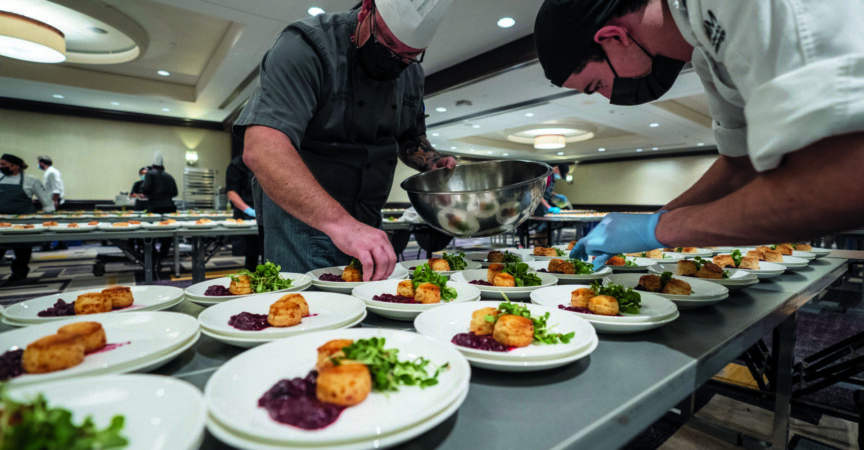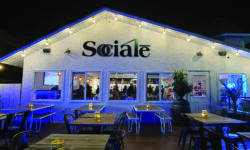La Tablée des Chefs: Feeding people today, developing food autonomy for tomorrow
The mission of La Tablée des Chefs is simple but profound: Feed. Educate. Their staff and volunteers combat food insecurity on multiple fronts, with an innovative food recovery program designed to feed people today, coupled with creative educational programs which provide skills and training to help young people develop food autonomy for the rest of their lives.
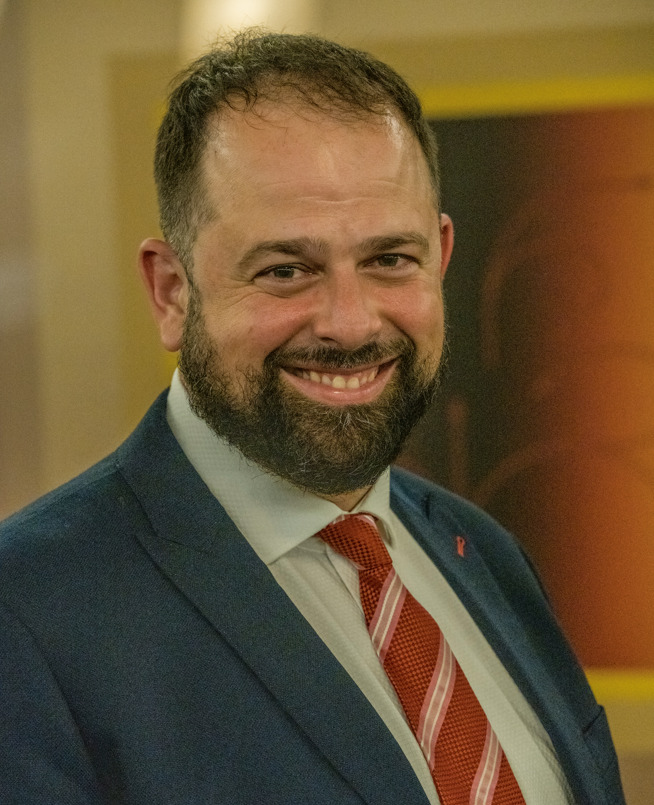
The growth and evolution of La Tablée des Chefs is due in large part to the passion and drive of founder Jean-François Archambault. As a student of hotel management, Archambault was struck by the amount of food wasted during the practical cooking lessons that were part of the curriculum. After graduating, he went on to work in the hotel industry, and saw more of the same in the hotel kitchens. Mentally multiplying the amount of waste by numbers of hotels sent him in search of facts and figures, and he spent time learning about food waste patterns and initiatives, trying to make sense of it.
Then in 2000, Archambault’s mother died of cancer. It was personally devastating, but also a trigger for action. “My mother was so involved in the community, so full of empathy. And I was not doing anything about the ideas I had. Losing the person I loved the most made me ask ‘What am I going to do?’ I realized I had to live my life to the fullest, to make the best of every day. It changed my perspective.”
Driven by that perspective shift, and the determination to push the limits every day, Archambault founded La Tablée des Chefs in 2002. The goal was straightforward: to collect the food that would otherwise go to waste in hotel and commercial kitchens, then make it available for local food distribution programs. For the first few years, it was an entirely volunteer endeavour, and he worked to grow the project on the sidelines of his full-time job. In 2005, Archambault stepped down as the chair of the volunteer board to take the position of general manager. “I quit my job, sold my house, and left everything to take this opportunity.”
New Directions
Since then, La Tablée des Chefs has grown in scope, reach and breadth. Their food recovery program liaises between food donors like hotels, stadiums and restaurants, and local community food distribution programs to ensure that a) food safety and security standards are met, and b) the food reaches those who need it most. To date they’ve
distributed more than 13 million cooked meals.
In the 20 years since its inception, La Tablée des Chefs has expanded its outreach in ways that Archambault did not originally expect. Food recovery had always been his objective. Then he met the head of Montreal’s health department while on the executive board of the city’s food bank. She had launched a study on the loss of culinary skills from generation to generation in low-income areas, and reading it expanded Archambault’s vision for La Tablée in a new but complementary direction.
Education, Archambault realized, was another powerful way to combat food insecurity. “That’s where it clicked for me. We needed to get chefs to share skills as well as food.” La Tablée des Chefs started their first food literacy programs in 2006-07, with pilot programs in four Montreal schools in the most economically depressed areas, giving students elemental food preparation skills and nutrition education. “Today we have programs in more than 215 schools,” he notes.
Today, La Tablée des Chefs offers diverse programs with different aims. The Kitchen Brigades, an extra-curricular workshop offered in high schools for students aged 12-17, teaches basic cooking techniques as well as healthy eating habits. The “Cook Up Your Future” culinary training program goes further. Designed for youth in care and in group homes, it has three distinct components and initiatives: a culinary kit, to equip young adults leaving care with tools they’ll be able to use for years; a series of 24 culinary workshops led by culinary and education professionals to provide the fundamentals of technique, hygiene and nutrition; and even socio-professional kitchen training support for participants who show real interest and aptitude.
Unilever has been a partner of La Tablées des Chefs since 2018 when they first learned what Archambault was doing to fight food insecurity and educate young people. Unilever first partnered with La Tablées des Chefs with their Hellmann’s mayonnaise brand, on a program to feed a stadium using food that would have otherwise been thrown out. “We are proud to continue our relationship with La Tablées des Chefs with both our Hellmann’s and Knorr brands as our missions are clearly aligned,” states Gary Wade, President, Unilever Canada.
Wade continues, “Hellmann’s purpose is to “Make Taste, Not Waste” with the ambition to inspire and enable millions of Canadians to be more resourceful with their food and therefore waste less. Hellmann’s Fridge Night app has been proven to reduce household food waste by one third, so we are thrilled to integrate this into The Kitchen Brigades curriculum to help more Canadians reduce their household food waste.”
“Knorr’s purpose is “Eat for Good” with the mission to inspire everyone to eat better for themselves and the planet. Knorr is a national partner in “Cook Up Your Future”, a culinary training program for young people. We hope that through the partnership young people will learn to make better food choices through greater variety, eating more plants and veggies and less meat,” says Wade.
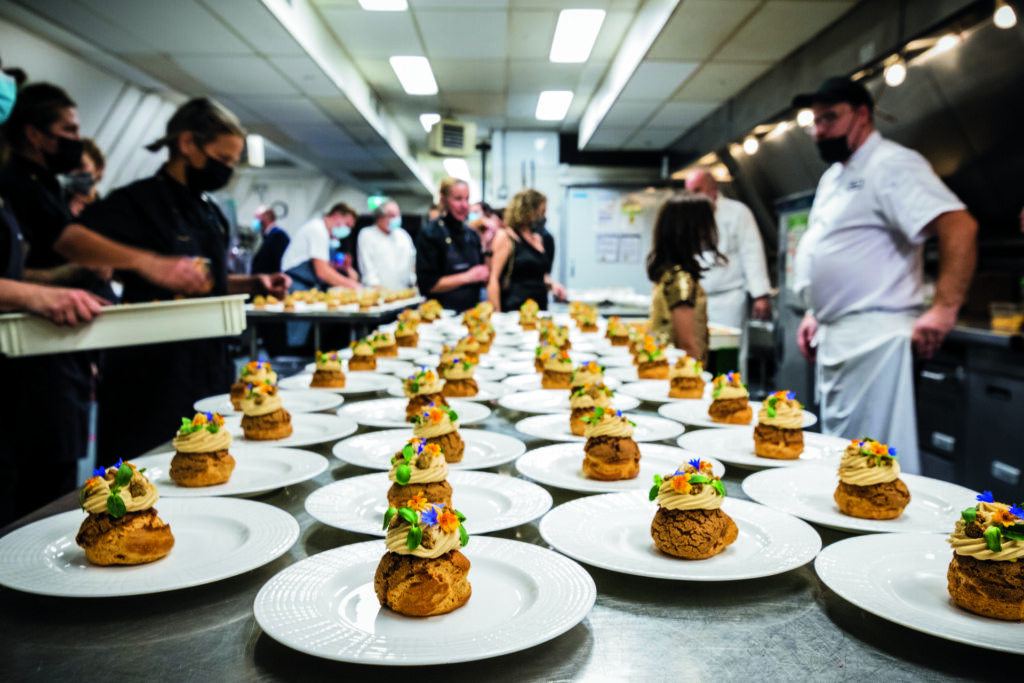
Food Insecurity in a Global Pandemic
Like other foodservice operations, the pandemic forced La Tablée des Chefs to pivot, but in an entirely different way. Archambault knew that he and his staff would be busier than ever. “We knew food insecurity would only go up. There was no question that our staff would be laid off—our work was needed more than ever.” As restaurants were shuttered and restricted, food banks were hard-pressed in every direction. Not only did food needs increase, but seniors, who were more vulnerable to severe cases of COVID-19, were not allowed to volunteer. In Quebec, where people 65 and older represent more than half of all volunteers in food banks and community organizations, this left food distribution
organizations understaffed in a time of great need.
La Tablée des Chefs was uniquely positioned at the start of the pandemic, as they were connected with chefs and engaged in addressing ever-increasing food needs. But their usual methods were no longer appropriate. Speaking with chefs who had closed their dining rooms gave Archambault the insight on how to adapt. “The wage subsidy gave me an idea. The operators could get 75 per cent of the wage if they kept cooks in the kitchen, and I would find a way to fundraise the other 25 per cent. That’s when we started Solidarity Kitchens.”
Solidarity Kitchens was a massive, multi-organizational success. Professional kitchens provided the space and skills, and La Tablée des Chefs provided the recipes and all the raw materials needed to prepare them, including containers. La Tablée liaised between the kitchens and local food distribution programs, arranging to have the prepared meals delivered to those in need. In addition, La Tablée gave the kitchens $1 for every meal prepared as part of their 25 per cent pledge.
It was truly a group effort. Archambault credits everyone involved for their generosity and flexibility. “With the hospitality industry down, I knew there would be food not going to kitchens. I got on calls with CEOs, with executive producers, and everyone I spoke to said, ‘everything you need’. We had 600 tonnes donated in the first year, and double that in the second year. Altogether, Solidarity Kitchens made 4 million meals for food security and distribution organizations.”
The pandemic affected their educational arm as well. Like other schools, La Tablée’s educational programs had to go virtual. Attendance dropped, and 175 different programs were trimmed down to 65. But La Tablée persevered, because food insecurity was only accelerated by the pandemic. “Chefs brought food to the schools,” says Archambault. “Kids picked it up, then brought it home and followed lessons online.” Now that schools are back in person, so are La Tablée’s programs, though they maintain an e-learning platform.
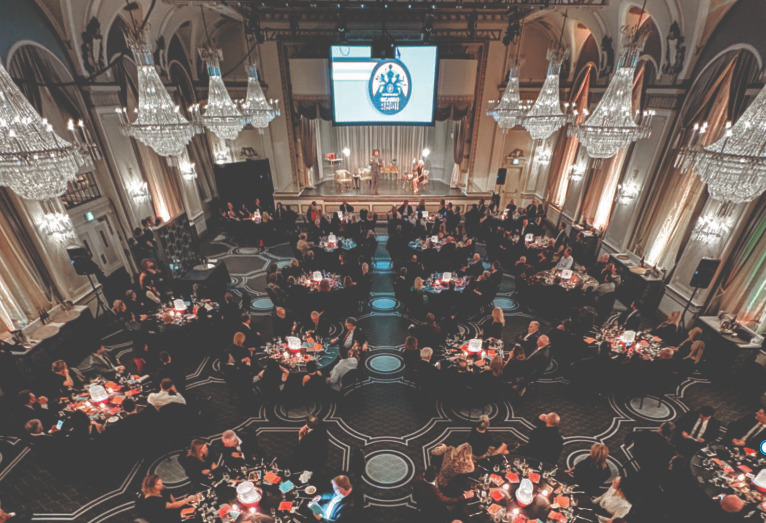
Les Grandes Tablées
La Tablée des Chefs relies on donations of ingredients, money and time. Archambault brings all the business development skills he gained in his hotel career to the task of acquiring those donations. “I used to convince people to choose my hotel properties to book their meetings or conventions. I was good at that. Applying those skills to social good and justice, being the voice that can step into the CEO’s office to ask for money, or to deliver something we know is needed—it’s what drives me. It brings me joy, happiness, adrenaline.”
Not that he does it alone: Archambault is forthright about his admiration for his team. “I’ve never had the luxury of having a team like we do now. I would not change the way it was set up for anything. Every experience we gained has made us stronger.” He is also very clear about the ultimate goal. “La Tablée isn’t mine. It’s a charity. It doesn’t belong to anyone —it belongs to everyone.”
Les Grandes Tablées is the charity’s only fundraising series, a gala event where they raise money, gather like-minded individuals together, and shine a light on everything they do. It’s a chance for the local business community to enjoy an evening out, dining in fine style while supporting La Tablée’s mission and programs. It’s a showstopper of an event,
full of local food and produce, cooked by passionate and generous chefs for a room full of epicureans who understand that gastronomy is best shared.
“It’s a celebration of La Tablée,” says Archambault. “A way to bring it to people who love good food, good wine, and are generous. We select chefs who share the values of La Tablée, have them work together in the kitchen to create an enchanting evening of local food and produce prepared by passionate chefs.”
Sobeys, a long-standing partner of IGA in Québec and in English Canada since 2018, is an enthusiastic partner of La Tablée des Chefs, supporting its Kitchen Brigades and Cook Up Your Future programs, as well as La Grande Tablée Gala. Jana Sobey, SVP Fresh Merchandising at Sobeys, is Co-Chair of La Grande Tablées organizing committee. The grocery company understands the importance of the underlying issue. “Food security programs are an important way that we invest in our communities to build healthier tomorrows for more Canadians. La Tablée des Chefs is especially meaningful to us as it directly supports vulnerable young people in our communities.”
Each Grande Tablée event is a window into what La Tablée des Chefs is all about. “Every year we involve the next generation,” says Archambault. “Culinary schools—students, chef instructors, teachers—they are all on hand to help. We also bring in students from our Kitchen Brigades programs: they get experience as a stage in the kitchen.” Most of all, having them in the room helps the attending epicureans truly understand the significance of their mission. “Gastronomy isn’t about spending alone, without any social impact. When you take something, you should give something.”
Looking to the Future
Funds raised at Les Grandes Tablées galas will go directly into their programs, so La Tablée des Chefs can continue to reach as many people as possible. Archambault wants to get more people excited about the project and the mission. La Tablée des Chefs was founded in Quebec and their base is there, but food insecurity spreads from coast to coast. “Let’s take what we’ve got and grow the movement, bringing it to more and more cities across Canada.”
Archambault sees communication as La Tablée’s next big challenge. “Surprising as it may seem, it’s not always easy to reach the people who need it the most. Building the workshop, testing the recipes – that’s not the hard part. The hardest part is delivery: making sure the right people, who need it the most, are getting the most.”
In the end, Archambault’s past will inform the future of La Tablée des Chefs. “I worked in hotels for years. My father was the legal advisor to the chefs’ organization. I saw the chefs’ generosity and passion, and knew I could create this social movement. My saddest moment turned out to become something that drove impact. My mom would have wanted that.”
2022 Grande Tablée Events:
Toronto: Monday, October 17 | Fairmont Royal York (Chef jW Foster)
Quebec City: Monday, November 14 |Fairmont Château Frontenac
Montreal: Monday November 21st | Hôtel Bonaventure Montréal



